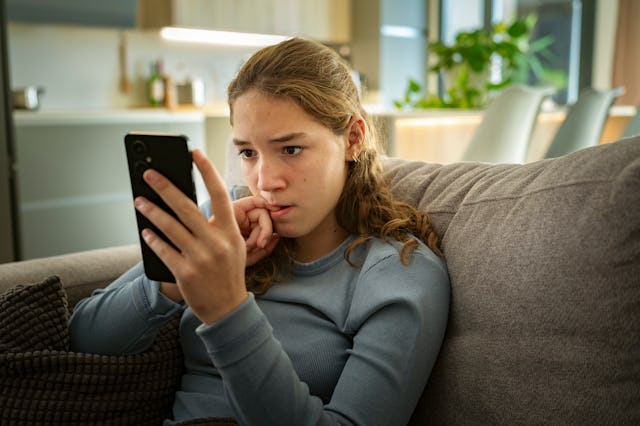Nearly Half Of Teens Now Think Social Media Hurts Their Mental Health
48% of teens said social media is bad for them, up from 32% in 2022.

Parents (and researchers) have long been pronouncing the dangers of social media on the developing teen brain. But, it turns out, there might actually be a decent chance that your teen isn’t scrolling through Instagram with rose-colored glasses.
A growing number of teens believe that social media adversely affects their generation's mental health, according to a new report from Pew Research Center. Nearly half of teens surveyed (48%) said that social media mostly has a negative effect on the mental health of their peers, up from 32% in 2022. Only 14%, however, felt that they were personally affected.
The survey revealed that teens hold somewhat conflicting views on social media. While roughly half said the sites negatively impact mental health, 34% reported that they at least sometimes get information about mental health on social media. And while 45% of teens said they spend too much time on social media, 74% said these platforms make them feel more connected to their friends.
Friendships, however, are the only category where the majority of teens said social media helped them, rather than hurting them or having no affect. The majority of teens also reported that social media hurt their sleep and productivity — a win for parents begging kids to please just leave the phone in the living room before bed.
Gender also seemed to impact teens’ experience on and views of social media, with teen girls reporting at a higher rate than boys that social media hurt their mental health (25% vs. 14%), confidence (20% vs. 10%) and sleep (50% vs. 40%).
“The people they see on social media, it makes them think they have to look and be like them or they won’t be liked,” wrote one teen girl who participated in the survey.
Parents, on the other hand, were more united in their negative view of social media. Social media was the top reason parents gave for declining teen mental health. Of parents who reported being at least somewhat concerned about mental health for teens, 44% said social media was the number one cause, followed by technology in general at 14%.
“They live in a fake world of social media that limits them as human beings, distancing them from their family,” one mother wrote in the study.
Having open conversations about metal health can help bridge the gap between parents’ and their children’s understanding of the issue, and also help struggling teens feel more supported. However, the survey found that teens are much less likely than their parents to feel comfortable discussing the topic together (80% vs. 52%).
Mental health can be a sensitive topic, and parents might feel wary about overstepping with teens. However, simply letting your child know that you’re there for them if they want to talk can be the little thing they need to open up — even if you aren’t necessarily sure if they need it.
“The overuse of social media in our society seems to be the main cause of depression among those in my age group,” wrote one teen boy in the survey. “People seem to let themselves be affected by the opinions of people they don’t know, and it wreaks havoc upon people’s states of mind.”